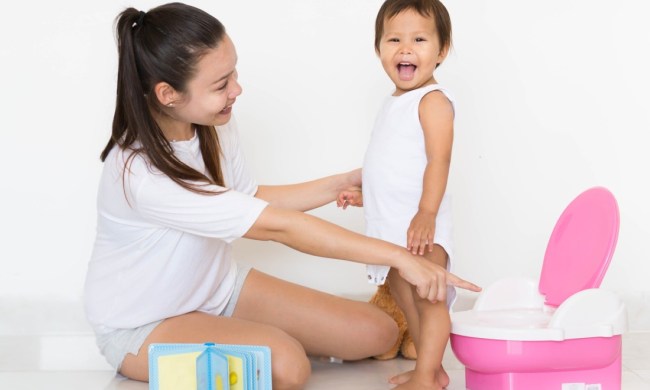Have you been out with your young child and your precious little one decided, while standing in the checkout line — with everyone staring at you — that this was the best time to throw a toy and scream? Or has your slightly older child decided, in the middle of a busy store, to let that cuss word (not heard from you, of course) slip?
Whether they mean it or not, kids sometimes act extremely inappropriately at the worst possible time. Okay, maybe sometimes they do it on purpose to get a rise out of you. But how you react to these fun situations will show your child how to deal with their emotions in the future. Let’s go over how to talk to your child about inappropriate behavior so the next time it’s a little easier for everyone.

What is inappropriate behavior for kids?
What exactly is inappropriate may differ parent by parent, but there are general rules that most can agree on. We’re sure you could add about 50 more to these lists, but since every child is different and not all children display every inappropriate behavior (thank goodness), we’re going with some of the more common ones.
For younger kids
- biting
- spitting
- hitting
- screaming/yelling back
- throwing tantrums
For older kids
- stealing
- destroying property
- lying
- cursing
- being disrespectful towards teachers/parents/adults/family
- cheating in school

What causes inappropriate child behavior?
You never know what could set a child off. But to stop that gross behavior, you have to find out what caused it and why your child is doing it.
Key causes
- neglect
- peer pressure
- mimicking another child/sibling
- not knowing how to properly deal with emotions
Most times your child isn’t trying to make you pull out your hair by demonstrating bad behavior. Likely it’s a feeling your kid hasn’t dealt with yet and doesn’t know any other way to express.
Another big reason why children act inappropriately is that they feel pushed out of the spotlight. Kids are so smart and know they can draw attention back to themselves in a hurry with a spitball or a scream.
What other factors should you think about?
When a child acts out and is being a bit rotten, it isn’t always for the reason you think. What else has happened in this kid’s life?
Things to ask yourself about the child:
- Did he have a life change?
- Is there a new sibling?
- Has she recently moved?
- Did he start a new school?
- Did her parents split up?
Any change in a child’s routine can make them turn to aggressive and even disgusting behavior. If your child is going through a life change, no matter how small it might seem, you need to talk it through before it happens, as it’s happening, and add that important follow-up after some time has passed.

What do you do when your child seems inappropriate?
Parents want to yell right back, ground for weeks, take away every privilege, and send kids to their room for unruly behavior. Sometimes parents want to laugh because even if your child said something wrong, it was funny. But this doesn’t solve anything. You need to be the responsible adult. Here are the ways you should talk it out instead.
Don’ts
Don’t ignore it
You have to face whatever it is your child is doing. Don’t not talk about it.
Don’t overreact
Deep, calming breaths. No yelling. No screaming. No shouting. No anger. You were a handful yourself once.
Don’t make your child feel embarrassed
You might feel embarrassed if your child says or does something a bit on the bad side in public. That’s fine. But don’t make your child feel that way. Don’t say anything to induce shame. Try to find the funny in it, but don’t laugh at what happened either. Save that for after bedtime.
Dos
Do speak it out
Talk to your child, not at your child. Treat your kiddo like a little adult. Even with children who are younger and can’t fully express themselves yet, you can still explain why what they did was incorrect. Kids just want to be treated like actual people.
Do stay consistent
You can’t punish your child when he says something improper one time and then talk it out the next. It’s confusing for your child and doesn’t help him know which the best way is to manage his behavior.
Do positively reinforce
If your kid has made progress in not doing the gross behavior, recognize it. Praise goes a long way. Let your child know you’ve noticed she’s trying hard to stop her behavior. Stock up on her favorite food, snacks, or a whole lot of hugs — whatever motivates your child.
We never want to see a child feel like acting inappropriately is the only way to get those tough feelings across. We only want a child to know how to express feelings through healthy communication. If you ever feel overwhelmed and think you need backup, there’s nothing wrong with talking to your child’s doctor or therapist.
Tough conversations will be a common occurrence the older your mini gets. It’s a learning process that you can work through together and come out with a stronger understanding of each other. If you calmly approach your child with honest dialogue, you can work through the inappropriate behaviors together. Or at least keep the cringe-y situations to a minimum.



